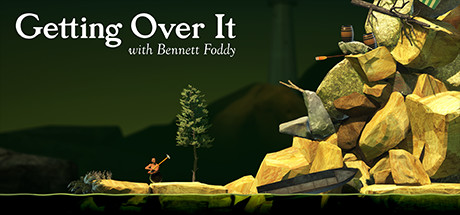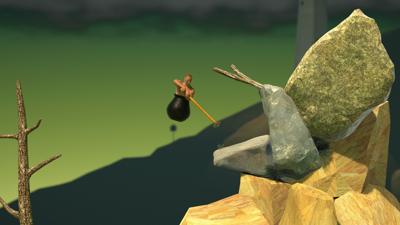Who Frustration is Good For
Getting Over It with Bennett Foddy went fairly viral so you may already be well familiar with it. If so, feel free to skip down past both pictures; I’m going to spend the intervening paragraphs explaining what the game is and how it works.

Bennett Foddy is a connoisseur of frustration. His first hit game, QWOP, took the simple act of running and made it nearly impossible by wrapping it in a seemingly-straightforward four-button control scheme with each button dedicated to a thigh or calf muscle. He’s made a few other games along similar lines, but his latest work, Getting Over It with Bennett Foddy, takes things to a new level.
The objective of Getting Over It is to scale a mountain. This task is harder than it may sound - Diogenes, the player character, can’t directly use his limbs. He can’t walk because he’s stuck in a cauldron for no clear reason, and his hands are permanently gripping a sledgehammer. The player moves the mouse to position the hammer, limited by Diogenes’s reach, to grip onto overhangs and pull Diogenes up, or to push against surfaces to propel Diognenes in the opposite direction.
It’s a control scheme that’s easy to understand but very hard to master. The player must take care to avoid rocketing themselves in unintended directions - and because they are trying to climb a mountain, gravity is constantly against them. Careless movements can easily send the player all the way back to the game’s beginning even after hours of careful progress. This is expected to happen to most players several times. This is actually the point of the game.
“Why did I make this? This horrible hike up an impossible mountain. I could have made something you would have liked. A game that was empowering, that would save your progress and inch you steadily forward. Since success is delicious, that would have been wise. Instead, I must confess, this isn’t nice. It tastes of bitterness. It’s capricious; it sets setbacks for the ambitious. It lacks lenience; it’s bracing and inhumane. But not everyone’s the same. I created this game for a certain kind of person. To hurt them.”
—Bennett Foddy, Getting Over It with Bennett Foddy Trailer
Getting Over It is a reaction to games that are intended to be easy to consume. It’s a meditation on the cultural role of experiences that demand nothing of their audience, as well as the sort of person who rejects such experiences. Getting Over It is not designed to be lazily strolled through and forgotten. It blocks the player’s path and demands they work to overcome it. It requires the player to invest blood, sweat, and tears - nothing less will do.

Foddy says he “created this game for a certain kind of person, to hurt them.” This isn’t malicious - it’s for people who enjoy being hurt in this very specific way. Foddy himself certainly appears to be one of these people - check out his blog post celebrating eleven distinct varieties of frustration.
Most of us are not this way. But aside from the masochists (and the streamers) I think there’s another audience who could get something out of this game. An audience I used to be a part of.
One of my most popular essays is Awesome By Proxy: Addicted to Fake Achievement. It tells the story of how I realized I’d been abusing RPGs for easy fake achievement. When I came to a challenge I couldn’t overcome, I would just grind levels until it wasn’t a challenge anymore. I relied on this crutch because I had lost the ability to stick with things that were actually hard. At the first sign of frustration, of difficulty that required actual self-improvement or development of skills, I gave up. My intelligence had allowed me to coast through school, but the “real world” beyond - where it wasn’t enough to just show that you were smart, but where you needed to actually accomplish things - terrified me. I didn’t see how I was going to be able to find and keep a reasonable job. All that I could see happening was that I’d be outed as a worthless human being.
The solution, I decided, was to practice tackling challenges for the sake of it, to build a habit of perseverance. And while I’d been using one kind of game as a way to avoid exactly that, it occurred to me that other kinds of games actually provided a perfect training ground. After all, the challenge itself was arbitrary, but it had to be low stakes, genuinely difficult, require extended practice, and have very clear success and failure modes.
So I decided to get all the emblems in Sonic Adventure DX. For most people, this would have been a waste of time. Anyone with baseline manual dexterity could pull it off, but why put in the time for something so irrelevant? For me, it was worth doing because I didn’t know whether I could do it. I had the dexterity, but I wasn’t sure I was tenacious enough to stick with it through repeated failure. I needed to demonstrate that I was psychologically capable of perseverance. So once I’d put in the hours and the practice and earned all the emblems, I felt hope. I saw a way to dig myself out and build myself up. And I started to believe that I could actually do it.
Maybe if Getting Over It with Bennett Foddy had been around back then, I would have played that instead. I see it as a waste of time now, but that says more about me than it does about the game. I don’t have to get over it with Bennett Foddy because I already got over it with Sonic the Hedgehog.
Foddy is focused on the frustration - that’s what fascinates him. What’s far more interesting to me is the ability to rise above frustration. The value of Getting Over It is to prove you can. To prove you can throw yourself at failure, over and over and over again, until you succeed. Because that’s how everything worth doing gets done.
I’m not going to play Getting Over It. I’m not telling you to, either. Maybe, like me, you don’t see a point to it. But maybe you do see a point. Maybe you like the idea of conquering it - of being someone who can conquer it - but aren’t sure that you are that person. If so - I’m telling you that I think you are that person. I believe you can do it.
Foddy says he made this game to hurt people. I think it can heal people too.